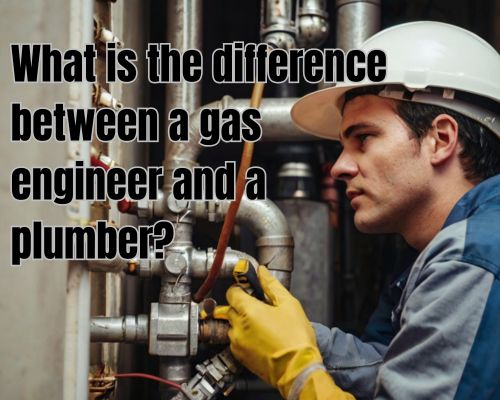
What Is the Difference Between a Gas Engineer and a Plumber?
When it comes to home maintenance or renovations in Australia, many people encounter situations that require professional help to handle gas or plumbing-related issues. However, the line between hiring a gas engineer or a plumber can often seem blurry. While both professionals deal with critical systems in your home, they have distinct roles, qualifications, and specialties. Understanding these differences is essential for making informed decisions and ensuring safety, efficiency, and compliance with Australian regulations.

What Does a Gas Engineer Do?
A gas engineer specializes in systems that involve gas, including installation, maintenance, and repair of gas appliances. Their expertise encompasses a wide range of tasks, such as:
- Gas Appliance Installation: Gas engineers handle installations of ovens, boilers, gas heaters, and hot water systems, ensuring they comply with local safety codes.
- Maintenance and Repairs: They perform regular servicing and troubleshooting for gas-powered systems to avoid leaks, inefficiencies, or hazards.
- Gas Leak Detection and Safety Checks: Licensed gas engineers use advanced tools to detect leaks and ensure systems meet Australian safety standards.
- Pipeline Work: They install and maintain pipelines that supply gas to your property or appliances.
In Australia, gas engineers must hold specific qualifications and licenses regulated at the state level. For example, in New South Wales (NSW), professionals must be accredited under the Gas Safety Act. Similarly, Victorian gas engineers require licenses issued by the Victorian Building Authority (VBA).
What Does a Plumber Do?
Plumbers focus on water-based systems and piping in both residential and commercial properties. Their work involves installing, maintaining, and repairing fixtures such as toilets, sinks, showers, and drainage systems. The primary responsibilities of a plumber include:
- Water Supply Systems: Plumbers ensure the proper functioning of pipes that bring clean water into your home.
- Drainage Systems: They manage wastewater removal by maintaining and repairing drainage systems and sewer lines.
- Hot Water Systems: While plumbers install hot water systems, they typically focus on electric and solar-powered units rather than gas-based ones.
- Fixture Installations: This includes fitting toilets, sinks, bathtubs, and dishwashers.
In Australia, plumbers must also meet licensing requirements that vary by state, see https://plumberwarragul.com.au/.
Key Differences Between a Gas Engineer and a Plumber
Although their work overlaps in some areas, the differences between a gas engineer and a plumber primarily lie in their training, licensing, and scope of expertise.
- Specialization:
- A gas engineer specializes in gas systems and appliances, with training focused on handling potentially hazardous materials.
- A plumber specializes in water systems, drainage, and general household piping needs.
- Licensing Requirements:
In Australia, gas engineers require specific gas-related licenses, while plumbers focus on certifications related to water and drainage systems. Some professionals are dual-certified, allowing them to handle both gas and water-related issues. - Services Provided:
- Gas engineers work exclusively on gas-powered systems like heaters and cooktops.
- Plumbers manage water and waste systems but may also work on non-gas-powered hot water systems.
Why Does It Matter Who You Hire?
Hiring the right professional for the job is crucial for safety, cost-efficiency, and compliance. Here’s why:
- Safety Concerns: Gas leaks or faulty installations can lead to serious hazards, including fires or carbon monoxide poisoning. Hiring a licensed gas engineer ensures that all work meets Australia’s strict safety standards.
- Compliance with Australian Laws: Both gas engineers and plumbers must follow state-specific codes, such as the Plumbing and Drainage Regulation in Queensland or the Gas Standards Regulations in Western Australia. Ensuring your contractor is qualified and licensed protects you from legal liabilities.
- Efficiency: Gas engineers and plumbers bring specialized knowledge to their work. Hiring the correct professional ensures your issue is resolved quickly and effectively, without unnecessary costs.
Overlapping Services: When Do You Need Both?
In some scenarios, you might need both a gas engineer and a plumber. For instance:
- If you’re installing a gas-powered hot water system, a plumber may handle the water connections, while a gas engineer ensures the gas fittings are safe and compliant.
- For kitchen renovations in Australian homes, plumbers might install sinks and dishwashers, while gas engineers handle the cooktop and oven installations.
How to Choose the Right Professional
To select the right expert, start by identifying the nature of the problem:
- If your issue involves gas-powered systems, such as gas heating or cooktops, contact a licensed gas engineer.
- For water-related issues, such as leaks, clogged drains, or fixture installations, a plumber is your go-to professional.
- When in doubt, hire a contractor who holds dual qualifications, which is increasingly common in cities like Brisbane and Adelaide.
Pro Tip: Always verify the professional’s licensing and qualifications. Most Australian states provide online tools to check credentials.
Why Licensing and Training Matter
Both gas engineers and plumbers undergo rigorous training to obtain their qualifications. This training ensures they adhere to Australian Standards (AS), such as:
- AS/NZS 5601 for gas installations, covering everything from pipework to appliance safety.
- AS/NZS 3500 for plumbing and drainage systems, ensuring proper water and waste management.
Licensed professionals are also insured, which protects homeowners against potential damages or accidents during the job.
Costs of Hiring a Gas Engineer vs. a Plumber in Australia
The cost of hiring these professionals varies depending on the job’s complexity and your location in Australia.
- Gas Engineers: Hourly rates for gas engineers typically range from $90 to $150, especially in metropolitan areas like Sydney or Melbourne.
- Plumbers: Plumbers charge between $80 and $130 per hour, with additional fees for emergency callouts or specialized tasks. See https://plumberwarragul.com.au/ for a detailed costing.
Final Thoughts
Understanding the difference between a gas engineer and a plumber is vital for Australian homeowners. Whether you’re upgrading your Melbourne kitchen, addressing a Brisbane gas leak, or installing a new hot water system in Perth, hiring the right professional ensures your job is completed safely and efficiently.
If you’re unsure, consult with a dual-licensed contractor or seek advice from local trade organizations like Master Plumbers Australia or Energy Safe Victoria. By choosing a qualified expert, you protect your property and ensure compliance with Australia’s stringent safety standards.
Make informed decisions, and your home systems will function seamlessly for years to come!





